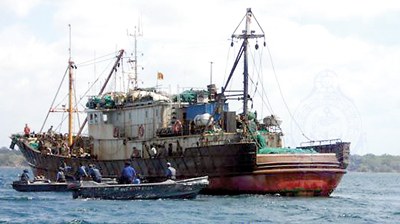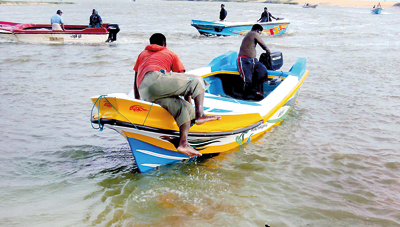News
Embassy takes custody of Chinese fishing crew
The 38 Chinese nationals aboard two Sri Lanka-owned fishing trawlers detected in the sea off the coast of Arugam Bay last week were charged with illegally fishing within Sri Lanka’s Exclusive Economic Zone (EEZ). Officers of the Eastern Naval Command seized the two trawlers and arrested the fishing crew who were charged with illegal poaching and handed them over to the Trincomalee Harbour Police.
The two vessels belonged to Arugambay Marine (Pvt) Ltd, a Sri Lankan-owned company. While the trawlers were registered with the Fisheries Department, the foreign crew had not been registered with the Fisheries and Aquatic Resources Department, explained Fisheries Ministry official N. D. Hettiarachchi.

One of the trawlers at the Navy harbour. Pic courtesy SL Navy
Mr. Hettiarachchi, who is the Fisheries and Aquatic Resources Department Director General, told the Sunday Times that Arugambay Marine had registered the two vessels with the Sri Lanka Board of Investment (BOI) and could be used for fishing in Sri Lankan waters, under a BOI-approved project. Certain BOI projects required foreign expertise, and these experts train locals in handling new equipment and technology.
“The rule is that the number of foreign staff cannot exceed the number of local staff. The majority should be locals, and the others can be from overseas,” he said.Mr. Hettiarachchi said Arugambay Marine had not informed the Fisheries and Aquatic Resources Department that the 38 Chinese fishermen on board the two vessels were not listed in their registry of foreign employees working in Sri Lanka. He said the department was not liable for unregistered persons. “Fisheries-based companies must get permission from the Fisheries and Aquatic Resources Department in order to recruit foreigners” he said.
The 38 Chinese nationals and two locals were produced before the Trincomalee Magistrate. The locals were released on bail of Rs. 100,000 each, and the Chinese nationals were handed over to the Chinese Embassy in Sri Lanka on Tuesday.
The Fisheries and Aquatic Resources Department permits Sri Lankan-owned vessels to fish in waters extending up to 200 nautical miles from the coast. Arugambay Marine is a large-scale BOI-approved fish export company, but under the 1996 Fisheries and Aquatic Resources Act large-scale fisheries companies may not fish inside the Exclusive Economic Zone.
BOI spokesperson Dilip S. Samarasinghe confirmed that Arugam Bay Marine was a BOI enterprise engaged in deep-sea fishing and fish export, and that BOI approval was given this year.
According to Mr. Samarasinghe, the BOI does not have any record of Arugambay Marine applying to hire foreign nationals. Foreign nationals who seek to work in the country for BOI enterprises require a BOI recommendation and clearance from the Ministry of Defence. The BOI facilitates work visas for foreign nationals.
Arugambay Marine owner Jamaldeen Zakariya told the Sunday Times that the two fishing vessels were brought to the country this year and registered with the Fisheries and Aquatic Resources Department on April 19. He said the BOI gave Arugambay Marine approval this year to engage in deep-sea fishing and the export of fish.
“I hired 38 Chinese to work on the trawlers, and I brought them to train locals so we could continue this project over the long term,” he said.
Mr. Zakariya said he informed the BOI, the Sri Lanka Navy and the Immigration Department that he was hiring 38 Chinese nationals, but not the Fisheries Ministry. The Chinese fishermen, who possessed Seaman Books, did not require passports and visas as they remained at sea and were not landing on Sri Lankan soil. A seaman’s book is a record of a seaman’s career certifications and experiences and is not a substitute for a passport or a visa. Speaking on behalf of the National Fisheries Solidarity Movement, spokesperson Herman Kumara said the future of the Sri Lanka fisheries industry was threatened by foreign poaching of resources in Sri Lankan waters.
“When our fishermen are arrested for straying into foreign waters, we have to raise a protest in order to bring our men back. The Chinese embassy was able to get their men back in just two days” Mr. Kumara observed.
He said the authorities should be alert about what is going on in the fishing industry, and that it should keep close tabs on fisheries businesses.
comments powered by Disqus




















